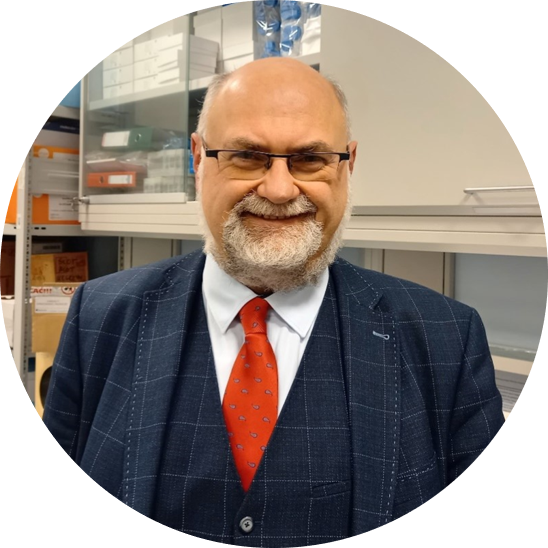
Antibiotics Webinar | Antibiotics vs. Phage Therapy
Part of the Antibiotics Webinar series
10 May 2021, 15:00
antibiotics, Phage therapy, Bacteriophages
Webinar Information
1st Antibiotics Webinar
Antibiotics vs. Phage Therapy
The antibiotic-resistance crisis demands the development of novel therapeutic approaches. Phage therapy (the use of bacteriophages to combat bacteria) is one of them. However, antibiotics are still important weapons in our fight against pathogenic microorganisms, and must be considered as we assess any novel approaches. This webinar is focused on the comparison and interplay between antibiotics and phage therapy. Invited speakers are Dr. Breck A. Duerkop (Assistant Professor, Department of Immunology and Microbiology, University of Colorado School of Medicine, Aurora, CO, USA), Dr. George Tetz (MD, PhD, Human Microbiology Institute, NY, USA), and Dr. Ryszard Miedzybrodzki (MD, PhD., Institute of Immunology and Experimental Therapy, Wroclaw, Poland). They will discuss various fascinating subjects related to phage-mediated dictation of antibiotic resistance and polymicrobial interactions, efficacy of phage therapy relative to the use of antibiotics, and also phages as new human pathogens. Therefore, different points of view will be presented, and different sides of phages and antibiotics will be discussed.
Experienced researchers, junior scientists, graduate and undergraduate students, as well as all other people interested in phage therapy and antibiotics are welcome to attend this webinar.
Dr. Grzegorz Węgrzyn
Department of Molecular Biology,
University of Gdansk,
Gdansk, Poland
Date: 10 May 2021
Time: 3:00pm CEST
Webinar ID: 871 6215 7238
Webinar Secretariat: antibiotics.webinar@mdpi.com
Chair: Dr. Grzegorz Węgrzyn
The following experts will present and talk:
|
Dr. Grzegorz Węgrzyn, University of Gdansk, Poland |
Grzegorz Węgrzyn has graduated from University of Gdansk, Poland. In 1987 he obtained MSc degree in biology, and in 1991 PhD degree in molecular genetics. His PhD thesis was focused on the regulation of DNA replication in starved cells. Then, he was a research fellow at the Department of Biochemistry, University of Nottingham Medical School (UK), where he worked on the mechanisms of gene expression regulation in bacteria and phages. Next, he was a post-doctoral researcher at the Center for Molecular Genetics, University of California at San Diego (USA), where he investigated the regulation of phage DNA replication. Since 1996 he is a Professor and Head of the Department of Molecular Biology at the University of Gdansk (Poland). In his laboratory, several projects are conducted, which are focused mainly on regulation of gene expression and DNA replication, control of the development of bacteriophages, and mechanisms and new treatment methods of human genetic and neurodegenerative diseases. Grzegorz Węgrzyn is a co-author of over 400 scientific articles in peer-reviewed journals and over 600 communications on scientific conferences. He supervised 53 PhD theses and led over 30 research projects within both national and international grants. He is a member of the American Society for Biochemistry and Molecular Biology, the American Society for Microbiology, and the International Society for Plasmid Biology. He is an editor of several scientific journals, including FEMS Microbiology Reviews, Microbial Cell Factories (Editor-in-Chief), Metabolic Brain Disease (Deputy-Chief-Editor), Plasmid, Scientific Reports (Senior Editor), and Acta Biochimica Polonica (Editor-in-Chief). Studies on bacteriophages conducted in the team led by Grzegorz Węgrzyn indicated molecular mechanisms of regulation of phage DNA replication, showed specific controls of phage gene expression and characterized various newly isolated bacteriophage suggesting their applicability in biotechnology and phage therapy. |
|
Dr. Breck A. Duerkop, University of Colorado, Aurora, CO, United States |
Breck A. Duerkop, PhD, earned his doctoral degree in Microbiology from the University of Washington, where he studied quorum sensing and secondary metabolite synthesis in Burkholderia. He completed postdoctoral research training at the University of Texas Southwestern Medical Center. During his postdoctoral studies, Dr. Duerkop used a combination of bacterial genetics and mouse models to determine how intestinal colonization influenced the biology of Enterococcus faecalis, a Gram-positive commensal and nosocomial pathogen. His work was among the first to reveal that phages impact the dynamics of bacterial colonization in the mammalian intestine. Currently, Dr. Duerkop is an Assistant Professor of Immunology and Microbiology at the University of Colorado School of Medicine, where his lab studies phage-host interactions. His lab focuses on phage infection mechanisms and responses in multidrug resistant enterococci. His lab has recently been exploring the molecular mechanisms of how enterococci develop resistance to phages and whether phages can synergize with clinically relevant antibiotics. His lab is also using metagenomics to study the influence of phage communities during intestinal inflammatory disorders such as inflammatory bowel diseases and rheumatoid arthritis, with the long-term goal of understanding how phages contribute to host-microbe interactions and their overall impact on human health. |
|
Dr. George Tetz, Human Microbiology Institute, New York, NY, United States |
Dr. Tetz was a pioneer in uncovering the role of bacteriophages as a new group of previously overlooked human viral pathogens. His research is focused on the study of how bacteriophages are implicated in a variety of human diseases and can be implicated in different multifactorial diseases including Parkinson’s diseases and type 1 diabetes. Recently, this effort was further scaled up and extended toward evaluation four crucial pathogenic mechanisms of how bacteriophages could trigger human diseases. This work has been further expanded towards target validation of bacteriophages as therapeutic targets and diagnostics in different human diseases. Dr. Tetz developed a novel concept for predictive phagobiome profiling. This methodology combined with multiomics measurements (metagenomics, metatranscriptomics, metabolomics) is intended to enable new approaches to diagnostics as well as a rational selection of patients for clinical trials. This research was published in multiple papers including first-tier Scientific Reports, Frontiers in Microbiology, Gut Pathogens which highlighted prior Bacteriophage study data and was noted as the most influential articles in 2016 and 2017, 2019 including one of the top 100 downloaded neuroscience papers for Scientific Reports in 2020. |
|
Dr. Ryszard Miedzybrodzki, Institute of Immunology and Experimental Therapy, Wroclaw, Poland |
Ryszard Międzybrodzki (MD, PhD) have been working at the Hirszfeld Institute of Immunology and Experimental Therapy PAS, Wroclaw, Poland (since 1996) as a researcher, and physician. There he conducts both preclinical studies on bacteriophage application in the treatment of bacterial infections at the Bacteriophage Laboratory as well as experimental phage therapy in humans at the Phage Therapy Unit – the first phage therapy dedicated center in EU in which over 700 patients were treated so far. Since 2013 he has been also working at the Department of Clinical Immunology of the Medical University of Warsaw. He organized and conducted postgraduate training of Polish and foreign physicians, and courses in phage therapy for students. Moreover, between 2003 and 2012, he conducted researches on isolation, culture and clinical application of human olfactory ensheathing cells and he was a member of a scientific team honored for “Functional regeneration of spinal cord in a patient with its complete injury following intraspinal transplantation of autologic olfactory ensheathing cells” by the Polish Prime Minister’s 3rd Award in 2015. He has published over 100 articles in majority related to the therapeutic phage application including his main fields of interest: the possibilities of phage use in the treatment of bacterial infections in humans (bioavailability and safety of the phage application) and new directions of clinical use of bacteriophages (anti-inflammatory and immunomodulating phage effects). |
Program
|
Speaker/Presentation |
Time in CET |
|
Dr. Grzegorz Węgrzyn Chair Introduction |
3:00 – 3:10 pm |
|
Dr. Breck A. Duerkop Enterococcal Phages Dictate Antibiotic Resistance and Polymicrobial Interactions |
3:10 – 3:40 pm |
|
Dr. George Tetz Bacteriophages as New Human Viral Pathogens |
3:40 – 4:10 pm |
|
Dr. Ryszard Miedzybrodzki New Directions of Bacteriophage Therapy |
4:10 – 4:40 pm |
|
Dr. Grzegorz Węgrzyn Bacteriophage-Derived Enzymes as Antimicrobial Agents |
4:40 – 5:10 pm |
|
Dr. Grzegorz Węgrzyn Q&A Session and Closing Remarks |
5:10 – 5:30 pm |
Webinar Content
On Monday, 10 May 2021, MDPI and the Journal Antibiotics organized the first webinar on Antibiotics, entitled "Antibiotics vs. Phage Therapy".
The introduction was held by the Chair of the webinar, Dr. Grzegorz Węgrzyn, a Professor and Head of the Department of Molecular Biology at the University of Gdansk in Poland. In his laboratory, several projects are conducted, which are focused mainly on regulation of gene expression and DNA replication, control of the development of bacteriophages, and mechanisms and new treatment methods of human genetic and neurodegenerative diseases. He also held the fourth and last presentation of the webinar, entitled "Bacteriophage-Derived Enzymes as Antimicrobial Agents".
The first speaker to quick off this webinar was Dr. Breck A. Duerkop. He is an Assistant Professor of Immunology and Microbiology at the University of Colorado School of Medicine, where his lab studies phage-host interactions. His presentation was entitled "Enterococcal Phages Dictate Antibiotic Resistance and Polymicrobial Interactions".
The second presentation with the title "Bacteriophages as New Human Viral Pathogens" was held by Dr. George Tetz from the Human Microbiology Institute (New York, United States). His research is focused on the study of how bacteriophages are implicated in a variety of human diseases and can be implicated in different multifactorial diseases including Parkinson’s diseases and type 1 diabetes.
Dr. Ryszard Miedzybrodzki from the Institute of Immunology and Experimental Therapy (Wroclaw, Poland) was the third speaker and his presentation was entitled "New Directions of Bacteriophage Therapy". He has published over 100 articles in majority related to the therapeutic phage application including his main fields of interest: the possibilities of phage use in the treatment of bacterial infections in humans (bioavailability and safety of the phage application) and new directions of clinical use of bacteriophages (anti-inflammatory and immunomodulating phage effects).
The presentations were followed by a Q&A, moderated by the Chair. The webinar was offered via Zoom and required registration to attend. The full recording can be found here on Sciforum website. In order to stay updated on the next webinars on Antibiotics, be sure to sign up for our newsletter by clicking on “Subscribe” at the top of the page.
Relevant Special Issues
Antibiotics vs. Phage Therapy
Guest Editor: Prof. Dr. Grzegorz Węgrzyn
Deadline for manuscript submissions: 30 September 2021










